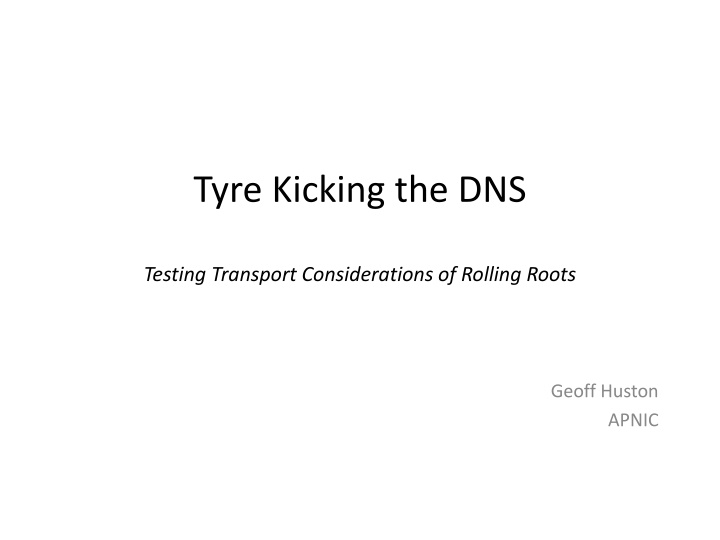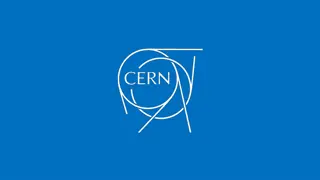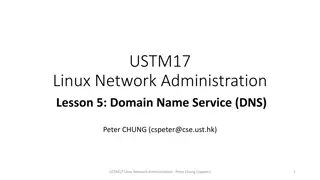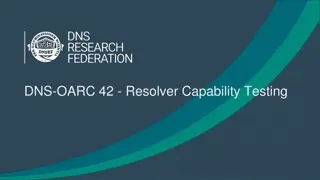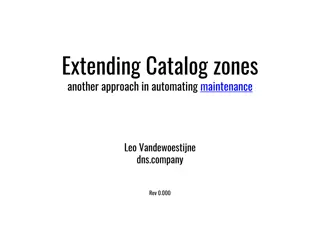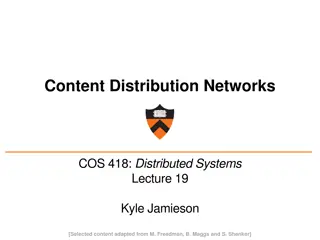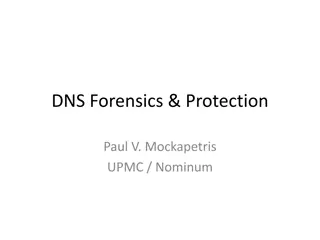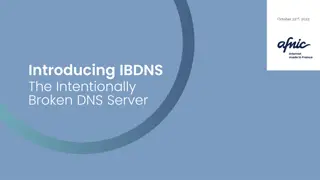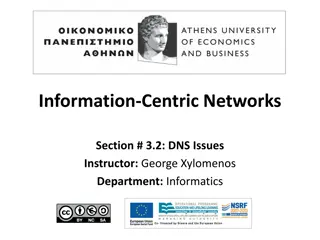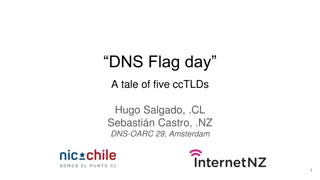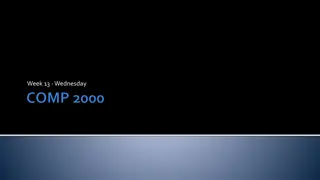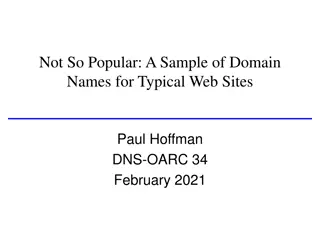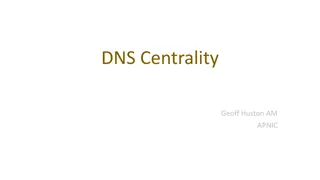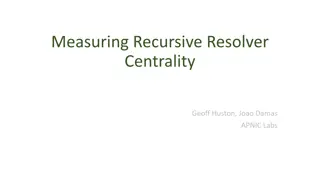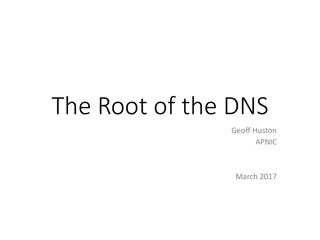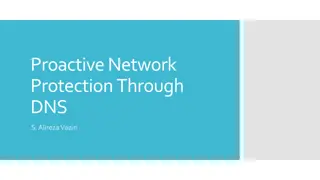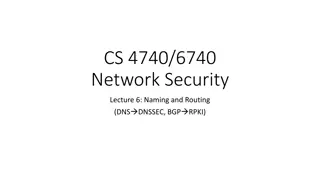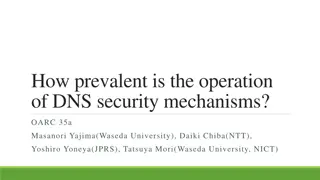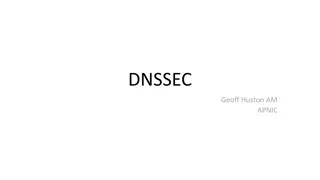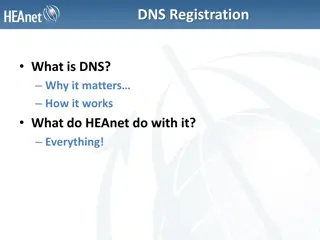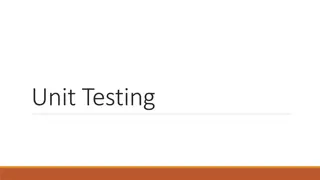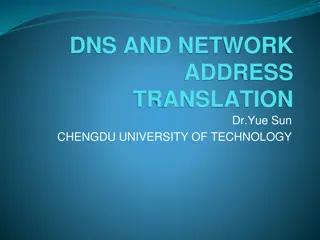DNS Testing and Signatures Rollover Analysis
In this content, Geoff Huston from APNIC discusses DNS testing and transport considerations, focusing on the rolling roots process. The discussion includes insights on rolling root keys, KSK repositories in the US and Amsterdam, and a step-by-step guide on how to perform a Key Signing Key (KSK) rollover effectively. The content also touches on the challenges and strategies involved in rolling over DNS keys. Illustrated with informative images, the presentation centers around the complexities of managing DNS security and key updates for consistent operational efficiency.
Download Presentation

Please find below an Image/Link to download the presentation.
The content on the website is provided AS IS for your information and personal use only. It may not be sold, licensed, or shared on other websites without obtaining consent from the author.If you encounter any issues during the download, it is possible that the publisher has removed the file from their server.
You are allowed to download the files provided on this website for personal or commercial use, subject to the condition that they are used lawfully. All files are the property of their respective owners.
The content on the website is provided AS IS for your information and personal use only. It may not be sold, licensed, or shared on other websites without obtaining consent from the author.
E N D
Presentation Transcript
Tyre Kicking the DNS Testing Transport Considerations of Rolling Roots Geoff Huston APNIC
The Amsterdam KSK Repository George Michaelson
Easy, Right? Publish a new KSK and include it in DNSKEY responses Use the new KSK to sign the ZSK (as well as the old KSK signature) Withdraw the old signature signed via the old KSK Revoke the old KSK
Easy, Right? Publish a new KSK and include it in DNSKEY responses Use the new KSK to sign the ZSK (as well as the old KSK signature) Withdraw the old signature signed via the old KSK Revoke the old KSK
Easy, Right? DNS Root KSK Rollover 2015 Rickroll analyze 2015 Q1 2015 Q2 2015 Q3 2015 Q4 T-10 T+0 T+10 T+20 T+30 T+40 T+50 T+60 T+70 T+80 T+0 T+10 T+20 T+30 T+40 T+50 T+60 T+70 T+80 T+0 T+10 T+20 T+30 T+40 T+50 T+60 T+70 T+80 T+0 T+10 T+20 T+30 T+40 T+50 T+60 T+70 T+80 T+90 Slot 1 Slot 2 Slot 3 Slot 4 Slot 5 Slot 6 Slot 7 Slot 8 Slot 9 Slot 1 Slot 2 Slot 3 Slot 4 Slot 5 Slot 6 Slot 7 Slot 8 Slot 9 Slot 1 Slot 2 Slot 3 Slot 4 Slot 5 Slot 6 Slot 7 Slot 8 Slot 9 Slot 1 Slot 2 Slot 3 Slot 4 Slot 5 Slot 6 Slot 7 Slot 8 Slot 9 ZSK-14q4 post-publish ZSK-14q4 ZSK-15q1 pre-publish ZSK-15q1 post-publish ZSK-15q1 ZSK-15q1 ZSK-15q1 ZSK-15q1 ZSK-15q1 ZSK-15q1 ZSK-15q1 ZSK-15q1 ZSK-15q1 ZSK-15q2 pre-publish ZSK-15q2 post-publish ZSK-15q2 ZSK-15q2 ZSK-15q2 ZSK-15q2 ZSK-15q2 ZSK-15q2 ZSK-15q2 ZSK-15q2 ZSK-15q2 ZSK-15q3 pre-publish ZSK-15q3 post-publish ZSK-15q3 ZSK-15q3 ZSK-15q3 ZSK-15q3 ZSK-15q3 ZSK-15q3 ZSK-15q3 ZSK-15q3 ZSK-15q3 ZSK-15q4 pre-publish ZSK-15q4 post-publish ZSK-15q4 ZSK-15q4 ZSK-15q4 ZSK-15q4 ZSK-15q4 ZSK-15q4 ZSK-15q4 ZSK-15q4 ZSK-15q4 ZSK-16q1 pre-publish ZSK-16q1 KSK-2010 publish+sign KSK-2010 publish+sign KSK-2010 publish+sign KSK-2010 publish+sign KSK-2010 publish+sign KSK-2010 publish+sign KSK-2010 publish+sign KSK-2010 publish+sign KSK-2010 publish+sign KSK-2010 publish+sign KSK-2010 publish+sign KSK-2010 publish+sign KSK-2010 publish+sign KSK-2010 publish+sign KSK-2010 publish+sign KSK-2010 publish+sign KSK-2010 publish+sign KSK-2010 publish+sign KSK-2010 publish+sign KSK-2010 publish+sign KSK-2010 publish+sign KSK-2010 publish+sign KSK-2010 publish+sign KSK-2010 publish+sign KSK-2010 revoke+sign KSK-2010 revoke+sign KSK-2010 revoke+sign KSK-2010 revoke+sign KSK-2010 revoke+sign KSK-2010 revoke+sign KSK-2015 publish KSK-2015 publish KSK-2015 publish KSK-2015 publish KSK-2015 publish KSK-2015 publish KSK-2015 publish KSK-2015 publish KSK-2015 publish KSK-2015 publish KSK-2015 publish KSK-2015 publish KSK-2015 publish KSK-2015 publish KSK-2015 publish KSK-2015 publish+sign KSK-2015 publish+sign KSK-2015 publish+sign KSK-2015 publish+sign KSK-2015 publish+sign KSK-2015 publish+sign KSK-2015 publish+sign KSK-2015 publish+sign KSK-2015 publish+sign KSK-2015 publish+sign KSK-2015 publish+sign KSK-2015 publish+sign Packet size increase due to larger DNSKEY RRset Packet size increase due to larger DNSKEY RRset Packet size increase due to larger DNSKEY RRset First time KSK-2015 is seen in DNS should be delayed until slot 2 of 2015 Q2 in order to minimize number of simultaneous changes Packet size increase due to multiple KSK signatures We are not required to revoke KSK-2010 at this point revocation could be delayed to lower risk Single UDP packet overflow!?
Easy, Right? DNS Root KSK Rollover Improved Rickroll 2015 Q1 2015 Q2 2015 Q3 2015 Q4 T-10 T+0 T+10 T+20 T+30 T+40 T+50 T+60 T+70 T+80 T+0 T+10 T+20 T+30 T+40 T+50 T+60 T+70 T+80 T+0 T+10 T+20 T+30 T+40 T+50 T+60 T+70 T+80 T+0 T+10 T+20 T+30 T+40 T+50 T+60 T+70 T+80 T+90 Slot 1 Slot 2 Slot 3 Slot 4 Slot 5 Slot 6 Slot 7 Slot 8 Slot 9 Slot 1 Slot 2 Slot 3 Slot 4 Slot 5 Slot 6 Slot 7 Slot 8 Slot 9 Slot 1 Slot 2 Slot 3 Slot 4 Slot 5 Slot 6 Slot 7 Slot 8 Slot 9 Slot 1 Slot 2 Slot 3 Slot 4 Slot 5 Slot 6 Slot 7 Slot 8 Slot 9 ZSK-14q4 post-publish ZSK-14q4 ZSK-15q1 pre-publish ZSK-15q1 post-publish ZSK-15q1 ZSK-15q1 ZSK-15q1 ZSK-15q1 ZSK-15q1 ZSK-15q1 ZSK-15q1 ZSK-15q1 ZSK-15q1 ZSK-15q2 pre-publish ZSK-15q2 post-publish ZSK-15q2 ZSK-15q2 ZSK-15q2 ZSK-15q2 ZSK-15q2 ZSK-15q2 ZSK-15q2 ZSK-15q2 ZSK-15q2 ZSK-15q3 pre-publish ZSK-15q3 post-publish ZSK-15q3 ZSK-15q3 ZSK-15q3 ZSK-15q3 ZSK-15q3 ZSK-15q3 ZSK-15q3 ZSK-15q3 ZSK-15q3 ZSK-15q4 pre-publish ZSK-15q4 post-publish ZSK-15q4 ZSK-15q4 ZSK-15q4 ZSK-15q4 ZSK-15q4 ZSK-15q4 ZSK-15q4 ZSK-15q4 ZSK-15q4 ZSK-16q1 pre-publish ZSK-16q1 KSK-2010 publish+sign KSK-2010 publish+sign KSK-2010 publish+sign KSK-2010 publish+sign KSK-2010 publish+sign KSK-2010 publish+sign KSK-2010 publish+sign KSK-2010 publish+sign KSK-2010 publish+sign KSK-2010 publish+sign KSK-2010 publish+sign KSK-2010 publish+sign KSK-2010 publish+sign KSK-2010 publish+sign KSK-2010 publish+sign KSK-2010 publish+sign KSK-2010 publish+sign KSK-2010 publish+sign KSK-2010 publish+sign KSK-2010 publish+sign KSK-2010 publish+sign KSK-2010 publish+sign KSK-2010 publish+sign KSK-2010 publish+sign KSK-2010 revoke+sign KSK-2010 revoke+sign KSK-2010 revoke+sign KSK-2015 publish KSK-2015 publish KSK-2015 publish KSK-2015 publish KSK-2015 publish KSK-2015 publish KSK-2015 publish KSK-2015 publish KSK-2015 publish KSK-2015 publish KSK-2015 publish KSK-2015 publish+sign KSK-2015 publish+sign KSK-2015 publish+sign KSK-2015 publish+sign KSK-2015 publish+sign KSK-2015 publish+sign KSK-2015 publish+sign KSK-2015 publish+sign KSK-2015 publish+sign KSK-2015 publish+sign KSK-2015 publish+sign KSK-2015 publish+sign KSK-2015 publish+sign KSK-2015 publish+sign KSK-2015 publish+sign Packet size increase due to larger DNSKEY RRset Packet size increase due to multiple KSK signatures Packet size increase due to multiple KSK signatures First packet size increase Second packet size increase Delayed revocation of KSK-2010 5011-compliant validators will start using KSK-2015 here Not updated 5011-noncompliant validators will fail here Response size for DNSKEY(.) 1024 bit ZSK 1024-bit ZSK 2048-bit ZSK 736 864 883 1139 1011 1139 1158 1414 1011 1139 1297 1425 736 864 883 1139 736 864 1297 1425 736 864 2048 bit ZSK . / IN / DNSKEY response size
But that was then And this is now: Resolvers are now not so aggressive in searching for alternate validation paths when validation fails (as long as resolvers keep their code up to date, which everyone does right?) And now we all support RFC5011 key roll processes And everyone can cope with large DNS responses So all this will go without a hitch Nobody will even notice the KSK roll at the root Truly ruly!
But that was then And this is now: Resolvers are now not so aggressive in searching for alternate validation paths when validation fails (as long as resolvers keep their code up to date, which everyone does right?) And now we all support RFC5011 key roll processes And everyone can cope with large DNS responses So all this will go without a hitch Nobody will even notice the KSK roll at the root Truly ruly!
What we all should be concerned about That resolvers who validate DNS responses will fail to pick up the new DNS root key automatically i.e. they do not have code that follows RFC5011 procedures for the introduction of a new KSK The resolvers will be unable to receive the larger DNS responses that will occur during the dual signature phase of the rollover
What can be tested That resolvers who validate DNS responses will fail to pick up the new DNS root key automatically i.e. they do not have code that follows RFC5011 procedures for the introduction of a new KSK Will resolvers be able to receive the larger DNS responses that will occur during the dual signature phase of the rollover
So weve been testing We are interested in sending DNSSEC-aware DNS resolvers a response that is much the same size as that being contemplated in a KSK key roll And seeing whether they got the response
Some Interesting Sizes 8 octets UDP pseudo header size 20 octets IPv4 packet header 40 octets maximum size of IPv4 options in an IPv4 IP packet header 40 octets IPv6 packet header 512 octets the maximum DNS payload size that must be supported by DNS 560 octets the maximum IPv4 packet size that must be supported by IPv4 DNS UDP systems 576 octets the largest IP packet size (including headers) that must be supported by IPv4 systems 913 octets the size of the current root priming response with DNSSEC signature 1,232 octets the largest DNS payload size of an unfragmentable IPv6 DNS UDP packet 1,280 octets the smallest unfragmented IPv6 packet that must be supported by all IPv6 systems 1,425 octets the largest size of a ./IN/DNSKEY response with a 2048 bit ZSK 1,452 octets the largest DNS payload size of an unfragmented Ethernet IPv6 DNS UDP packet 1,472 octets the largest DNS payload size of an unfragmented Ethernet IPv4 DNS UDP packet 1,500 octets the largest IP packet supported on IEEE 802.3 Ethernet networks
EDNS(0) UDP Buffer sizes Around the 1425 octet response size we will see UDP response truncation rates of around 5.5%
The Test Method We are using a mechanism to measure the Internet from the edge : We use an ad with an active script element When a browser receives an impression of the ad the script is activated The script fetches a small number (5) of 1x1 blots, and then fetches a final blot to tell us which ones it actually received As long as every DNS name in the URLs of these blots is unique, then DNS and Web proxies can t interfere! Our servers see the DNS queries and the Web fetches We can infer client-side behaviours based on these observations * Acknowledgement and thanks to Google for supporting this work
The Test We are interested in resolvers who are DNSSEC aware (queries that contain the EDNS0 option with DNSSEC OK flag set on) We would like to test larger responses: 1,440 octets of DNS payload We would like to test a couple of crypto protocols RSA ECDSA
Testing We are interested in those resolvers that are retrieving DNSSEC signature data, so we are looking for queries that include EDNS0 and DNSSEC OK flag set How many resolver queries have DNSSEC OK set?
EDNS(0) DNSSEC OK Set 76,456,053 queries 63,352,607 queries with EDNS(0) and DNSSEC OK set = 83% of queries 777,371 resolvers 649,304 resolvers with EDNS(0) and DNSSEC OK set = 84% of resolvers
Large Responses How well are 1,440 octet DNS responses handled when compared to much smaller responses?
1,440 octet RSA-signed Responses 9,113,215 tests 7,769,221 retrieved the 1x1 blot (85%) 2,644,351 queried for the DS record 849,340 queried for the DS record (but no blot fetch) 494,581 timed out (but no blot fetch) 72 appeared to fail the DNS
1,440 octet RSA-signed Responses 9,113,215 tests 7,769,221 retrieved the 1x1 blot 2,644,351 queried for the DS record 849,340 queried for the DS record (but no blot) 494,581 timed out (but no blot) 72 appeared to fail the DNS
1,440 octet RSA-signed Responses 9,113,215 tests 7,769,221 retrieved the 1x1 blot 2,644,351 queried for the DS record 849,340 queried for the DS record (but no blot) 494,581 timed out (but no blot) 72 appeared to fail the DNS
Small vs Large What happens when the response size grows above 1,472 octets? 1,440 Octets Payload 1,770 Octets Payload Experiments: 6,542,993 Web Fetch: 5,880,921 DS Fetch: 181,610 Timeout: 480,415 DNS Fail: 47 Experiments: 6,566,645 Web Fetch: 5,992,617 DS Fetch: 167,119 Timeout: 401,831 DNS Fail: 5,078
ECDSA vs RSA The spec says that when a resolver encounters a zone signed only with algorithms that are not supported by the resolver then it will treat the zone as unsigned and not proceed with validation Most resolvers determine the zone s signing algorithms from the DS record What happens when we compare a 1,440 octet response signed by RSA and a 1,440 octet response signed by ECDSA?
1,440 octet ECDSA-signed Responses 9,137,436 tests 7,766,572 retrieved the 1x1 blot 2,644,564 queried for the DS record 860,163 queried for the DS record (but no blot) 505,045 timed out (but no blot!) 5,656 appeared to fail the DNS
1,440 octet ECDSA-signed Responses 9,137,436 tests 7,766,572 retrieved the 1x1 blot 2,644,564 queried for the DS record 860,163 queried for the DS record (but no blot) 505,045 timed out (but no blot!) 5,656 appeared to fail the DNS
IPv4 vs IPv6 Do resolvers prefer IPv4 over IPv6? Total Queries: 47,826,735 Queries over V6: 394,816 Number of Resolvers: 109,725 Number of Resolvers using IPv6 for queries: 2,849
IPv4 vs IPv6 Do resolvers prefer IPv4 over IPv6? Total Queries: 47,826,735 Queries over V6: 394,816 Number of Resolvers: 109,725 Number of Resolvers using IPv6 for queries: 2,849
Some Observations There is a LOT of DNSSEC validation out there 87% of all queries have DNSSEC-OK set 30% of all DNSSEC-OK resolvers attempt to validate the response 25% of end users are using DNS resolvers that will validate what they are told 12% of end users don t believe bad validation news and turn to other non-validating resolvers when validation fails.
Some Observations There is very little V6 being used out there 1% of queries use IPv6 as the transport protocol when given a dual stack name server It seems that when given a choice: Browsers prefer IPv6 Resolvers prefer IPv4
Some Observations ECDSA is viable sort of 1 in 5 clients who use resolvers that validate RSA- signed responses are unable to validate the same response when signed using ECDSA But they fail to unsigned rather than invalid so it s a (sort of) safe fail
Can it work? If we stick to RSA and keep response sizes at or below 1,440 octets then there appears to be no obvious user impact in terms of packet size Some resolvers may get stuck, but users appear to use multiple resolvers
Questions? Geoff Huston George Michaelson
